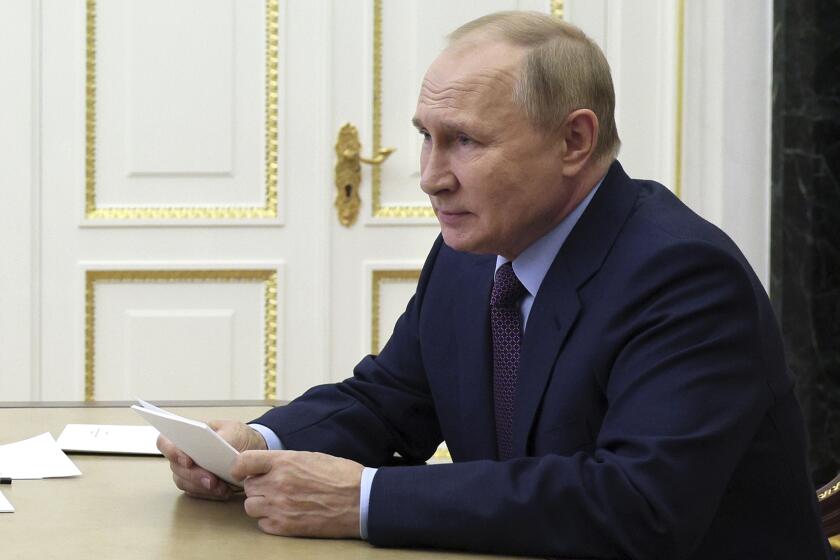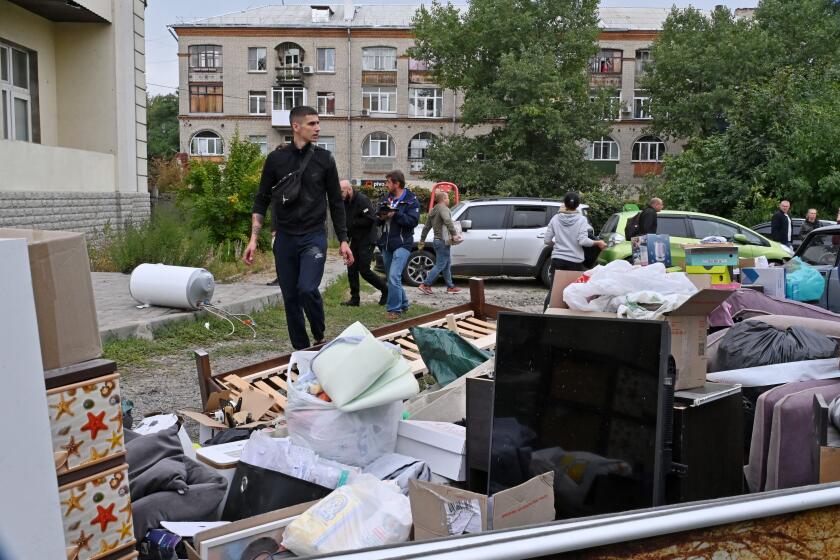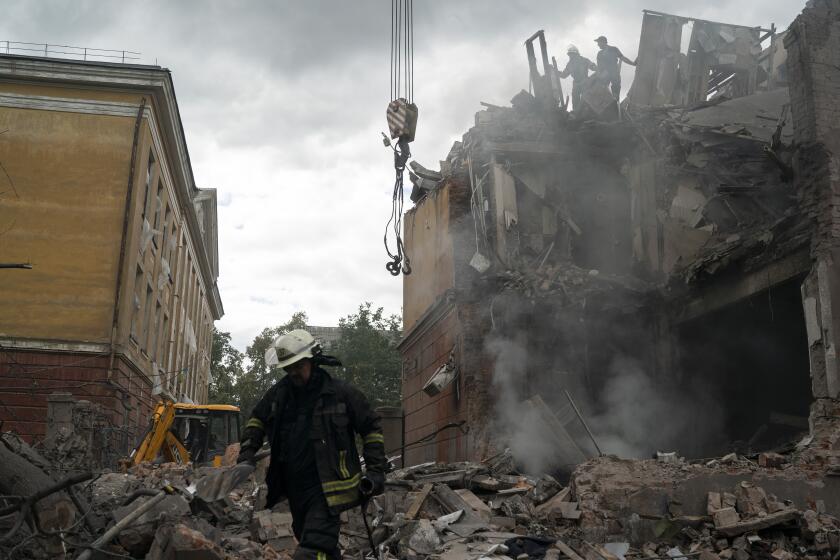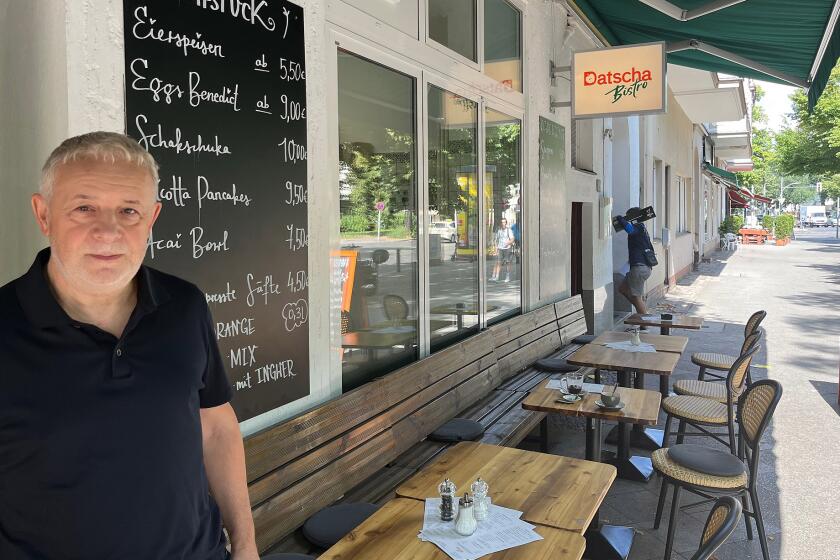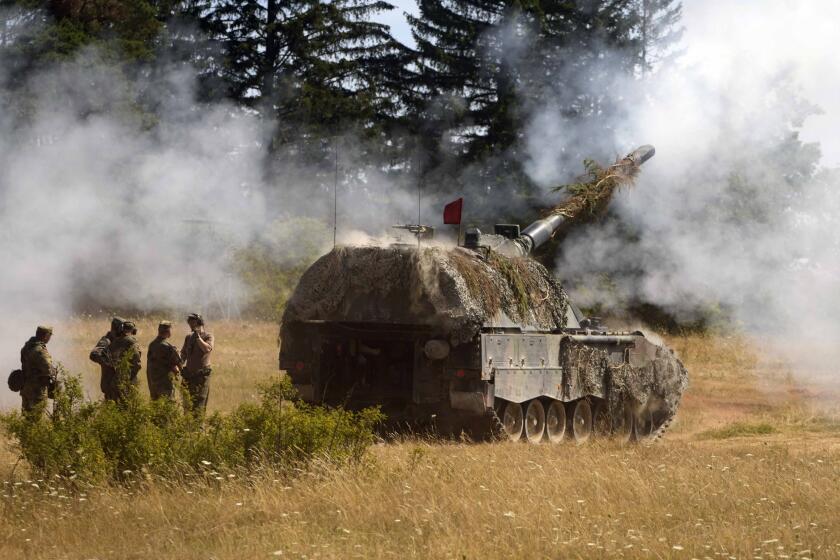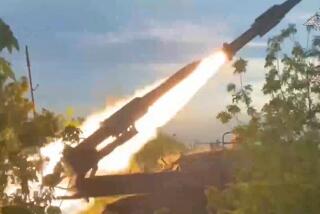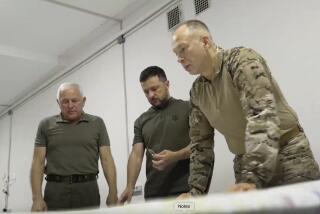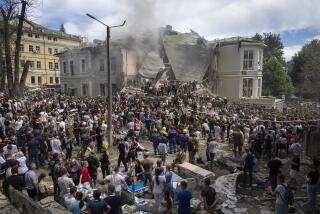Some bodies found in new mass burial site show signs of torture, Ukraine says

Ukrainian authorities begin recovering bodies from a newly found mass burial site in a forest recaptured from Russian forces.
- Share via
IZYUM, Ukraine — Investigators searching through a mass burial site in Ukraine have found evidence that some of the dead were tortured, including bodies with broken limbs and ropes around their necks, Ukrainian President Volodymr Zelensky said Friday.
The site near the northeastern city of Izyum, recently recaptured from Russian forces, appears to be one of the largest discovered in Ukraine.
Zelensky spoke in a video he rushed out just hours after the exhumations began, apparently to underscore the gravity of the discovery. He said more than 440 graves have been found at the site but that the number of victims was not yet known.
Digging in the rain, workers hauled body after body out of the sandy soil in a misty pine forest near Izyum. Protected by full body suits and rubber gloves, they gently felt through the decomposing remains of the bodies’ clothing, apparently looking for things that might identify them.
Associated Press journalists who visited the site saw graves marked with simple wooden crosses. Some of the markers bore people’s names and had flowers hanging from them.
The State Department says Russia has covertly spent more than $300 million since 2014 to try to influence politicians and other officials in more than two dozen countries.
Before digging, investigators with metal detectors scanned the site for explosives, and soldiers strung red and white plastic tape between the trees.
Zelensky said hundreds of civilian adults and children, as well as soldiers, had been found near Izyum’s Pishchanske cemetery after being tortured, shot or killed by artillery shelling.
He cited evidence of atrocities, such as a body with a rope around its neck and broken arms. In another sign of possible torture, one man was found with his hands tied, according to Serhiy Bohdan, the head of Kharikiv police investigations, and Ukraine’s commissioner for human rights, Dmytro Lubinets.
Ukrainian authorities warned that their investigation was just beginning, and the scale of the killings could rise dramatically.
A Ukrainian medic captured in the deadly siege of Mariupol tells U.S. lawmakers how Russians routinely tortured her and other prisoners, some fatally.
“The harsh reality indicates that the number of dead in Izyum may be many times higher than the Bucha tragedy,” Oleg Kotenko, an official with the Ukrainian ministry tasked with reintegrating occupied territories, said on Telegram.
Bucha is a Kyiv suburb where authorities have said 458 bodies were found after a 33-day Russian occupation. Authorities say they have uncovered the bodies of more than 1,300 people elsewhere, many in mass graves in the Kyiv-area forest.
Zelensky, who visited the Izyum area Wednesday, said the discoveries showed again the need for world leaders to declare Russia a state sponsor of terrorism.
Meanwhile, in his first public comments on Ukraine’s recent battlefield gains, Russian President Vladimir Putin vowed to press on with the war and warned that Moscow could ramp up its strikes on the country’s vital infrastructure if Ukrainian forces target facilities in Russia.
“If the situation develops this way, our response will be more serious,” Putin told reporters Friday after attending a summit of the Shanghai Cooperation Organization in Uzbekistan.
Ukraine scored its biggest victories in months in the country’s northeast. But can that help break a bloody stalemate?
Russia has reported numerous explosions and fires at civilian infrastructure sites near Ukraine, as well as munitions depots and other facilities. Ukraine has claimed responsibility for some of the attacks and refrained from commenting on others.
The “liberation” of Ukraine’s entire eastern Donbas region remained Russia’s main military goal, Putin said.
“We aren’t in a rush,” he said, adding that Russia has only deployed volunteer soldiers to fight in Ukraine.
Some hard-line Russian politicians and military bloggers have lamented manpower shortages and urged the Kremlin to follow Ukraine’s example and order broad mobilization to beef up the ranks.
Ukrainian forces gained access to the site near Izyum after recapturing the city and much of the wider Kharkiv region in a lightning advance that suddenly shifted the momentum in the nearly seven-month war. Ukrainian officials also found evidence of torture elsewhere in the region.
The U.N. human rights office said it would investigate, and the human rights group Amnesty International said the discovery of the mass burial site confirmed “our darkest fears.”
The Biden administration will provide $2 billion in long-term foreign military financing to Ukraine and 18 of its neighbors, including NATO members.
“For every unlawful killing or other war crime, there must be justice and reparation for victims and their families and a fair trial and accountability for suspected perpetrators,” said Marie Struthers, the group’s director for Eastern Europe and Central Asia.
Most of the people buried at the site were believed to be civilians, but a marker on one mass grave said it contained the bodies of 17 Ukrainian soldiers.
Russian officials distanced themselves from responsibility for the site.
The Khariv region’s Russian-installed governor, Vitaly Ganchev, told Russia’s state-run Tass news agency that Ukrainian, not Russian, forces were responsible for civilian casualties in Izyum. Tass also quoted a member of Russia’s parliament, Alexander Malkevich, claiming that Ukrainian troops had abandoned their dead, so Russian forces buried them.
Elsewhere in Ukraine, the war continued to claim lives and wreak destruction. Zelensky’s office said Russian shelling killed five civilians and wounded 18 others in a 24-hour span. Missile strikes were also reported, with Zelensky’s hometown of Kryvyi Rih among the targets for a third consecutive day Friday. Air-raid sirens also howled in the capital, Kyiv.
Start your day right
Sign up for Essential California for the L.A. Times biggest news, features and recommendations in your inbox six days a week.
You may occasionally receive promotional content from the Los Angeles Times.
More killings targeting pro-Russian separatist officials were reported in areas under the secessionists’ control. Separatist authorities said a blast killed the prosecutor-general of the self-proclaimed republic in the Luhansk region, part of Ukraine’s eastern Donbas heartland. Moscow-backed authorities said two Russian-installed officials were also killed in Berdyansk, a city in the Zaporizhzhia region occupied earlier in the war. And local authorities reported three people were killed in a Ukrainian missile strike on an administrative building in Russian-occupied Kherson.
At the Izyum burial site, the marking of individual graves with wooden crosses differed from other burial sites discovered earlier in the war and seen by journalists — including some around Kyiv that are being investigated as sites of possible war crimes. Bodies found outside the capital in Bucha and elsewhere after Russian forces withdrew had been dumped together and buried without markers.
Germany is home to one of the world’s biggest Russian diaspora communities, but the Ukraine war has sparked incidents of ostracism and discrimination.
Izyum resident Sergei Gorodko said that among the hundreds buried in individual graves were dozens of adults and children killed in a Russian airstrike on an apartment building.
He said he pulled some of them out of the rubble “with my own hands.”
Izyum was a key supply hub for Russian forces until they withdrew in recent days. City Councilor Maksym Strelnikov told reporters in an online briefing from an undisclosed location this week that hundreds of people had died during the fighting and after Russia seized the town in March. Many couldn’t get a proper burial, he said.
His claims could not be immediately verified, but similar scenes have played out in other cities captured by Russian forces, including the southern port city of Mariupol.
The national police chief, Ihor Klymenko, said “torture chambers” have been found in recaptured towns and villages of the Kharkiv region. The claim could not be independently verified.
After decades of neglect and the stigma of its Nazi past, Germany warms up to the idea of rebuilding its army, thanks to the war in Ukraine.
Seven Sri Lankan students who fell into Russian hands in Kupiansk, in the Kharkiv region, have also said that they were mistreated, he said.
“They are scared, they were abused,” Klymenko said. They include “a woman who can barely speak” and two with torn toenails.
More to Read
Sign up for Essential California
The most important California stories and recommendations in your inbox every morning.
You may occasionally receive promotional content from the Los Angeles Times.
